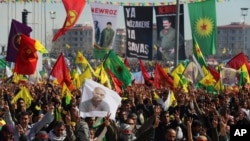DIYARBAKIR —
Turkish paramilitary forces fired teargas and water cannons on Friday to try to reopen a highway blocked for almost a week by militants in the predominantly Kurdish southeast, security sources said.
Kurdistan Workers Party (PKK) militants have blocked various points on the highway between Diyarbakir and Bingol provinces with trucks and cars seized over the past six days in protest at the building of several new military outposts.
The blockade has raised tensions in the region and exposed the fragility of a peace process which Prime Minister Tayyip Erdogan launched with PKK leader Abdullah Ocalan in 2012 to try to end a three-decade insurgency that has killed 40,000 people.
PKK sympathizers threw home-made grenades at paramilitary forces, who responded with teargas and water cannon, security sources involved in the operation told Reuters. Bulldozers moved in to fill holes in the road dug by the protesters.
Kurdish support could be key to Erdogan if, as widely expected, he runs in Turkey's first direct presidential election in August. Kurds constitute Turkey's largest minority, accounting for around a fifth of the population.
Erdogan would need a simple majority to win in the first round. His AK Party secured support of around 45 percent nationwide in municipal elections at the end of March, suggesting every vote will count.
The PKK took up arms against Turkey in 1984 with the aim of carving out a separate state in the southeast for the country's Kurds, which make up around 20 percent of the population but have long been denied basic political and cultural rights.
Erdogan has invested considerable political capital in peace efforts, widening cultural and language rights at the risk of alienating parts of his grassroots support base. The PKK is designated a terrorist group by Ankara, the United States and European Union and Ocalan remains widely reviled among Turks.
Kurdistan Workers Party (PKK) militants have blocked various points on the highway between Diyarbakir and Bingol provinces with trucks and cars seized over the past six days in protest at the building of several new military outposts.
The blockade has raised tensions in the region and exposed the fragility of a peace process which Prime Minister Tayyip Erdogan launched with PKK leader Abdullah Ocalan in 2012 to try to end a three-decade insurgency that has killed 40,000 people.
PKK sympathizers threw home-made grenades at paramilitary forces, who responded with teargas and water cannon, security sources involved in the operation told Reuters. Bulldozers moved in to fill holes in the road dug by the protesters.
Kurdish support could be key to Erdogan if, as widely expected, he runs in Turkey's first direct presidential election in August. Kurds constitute Turkey's largest minority, accounting for around a fifth of the population.
Erdogan would need a simple majority to win in the first round. His AK Party secured support of around 45 percent nationwide in municipal elections at the end of March, suggesting every vote will count.
The PKK took up arms against Turkey in 1984 with the aim of carving out a separate state in the southeast for the country's Kurds, which make up around 20 percent of the population but have long been denied basic political and cultural rights.
Erdogan has invested considerable political capital in peace efforts, widening cultural and language rights at the risk of alienating parts of his grassroots support base. The PKK is designated a terrorist group by Ankara, the United States and European Union and Ocalan remains widely reviled among Turks.





